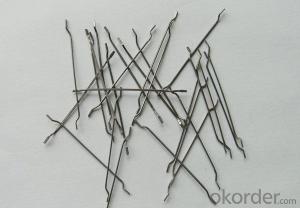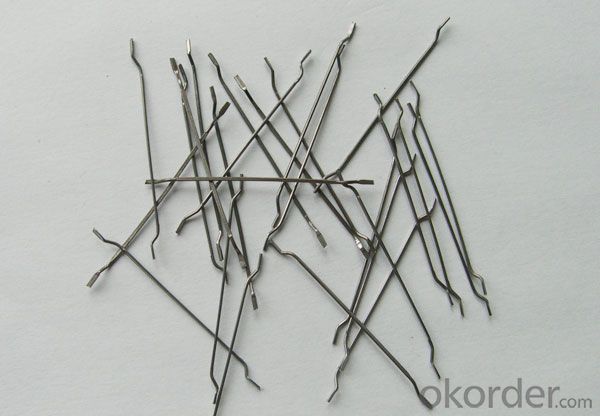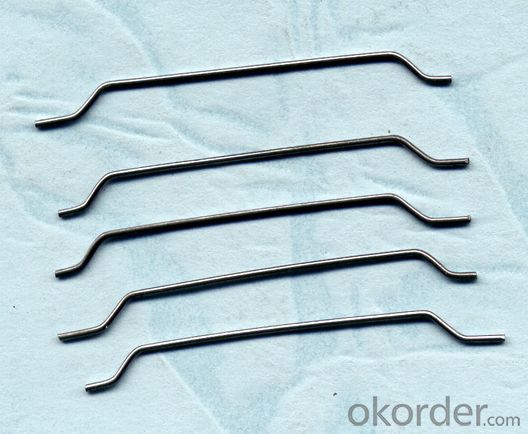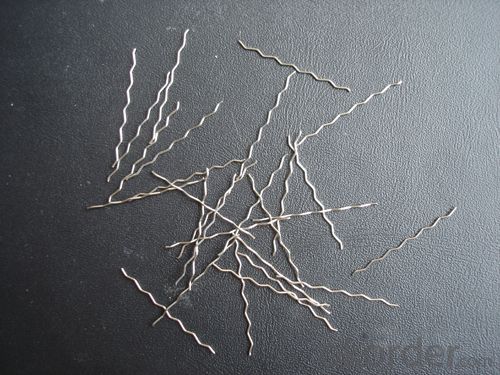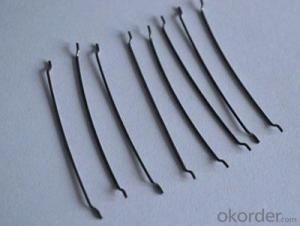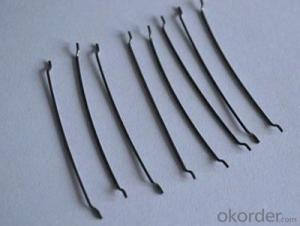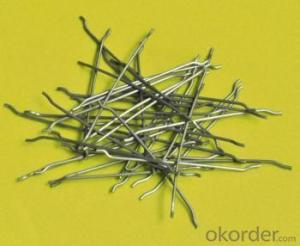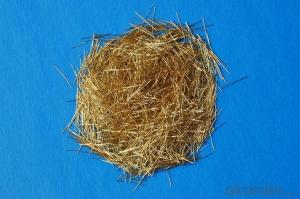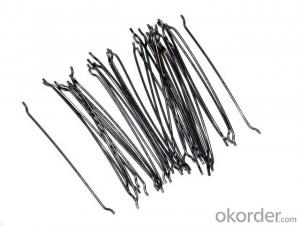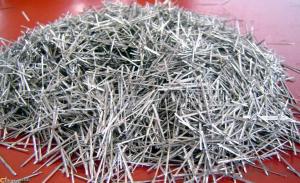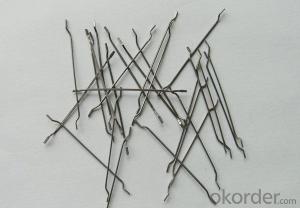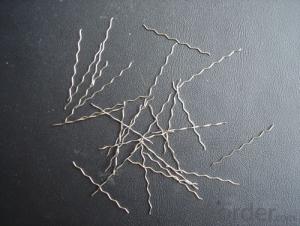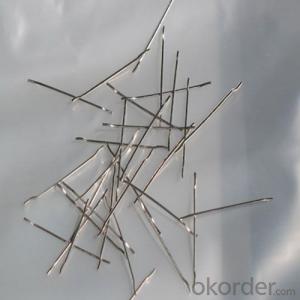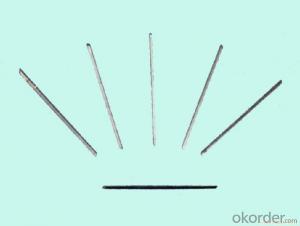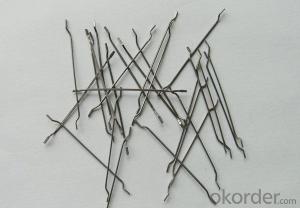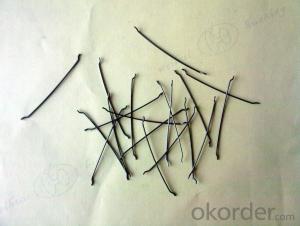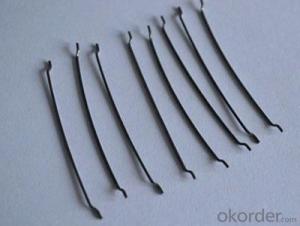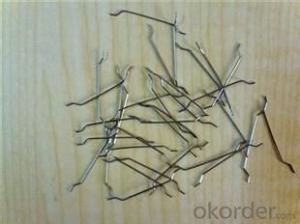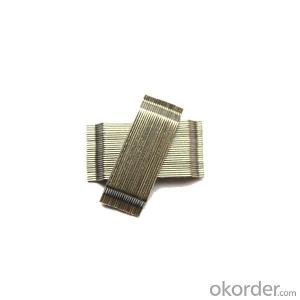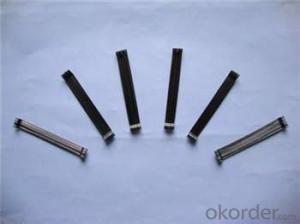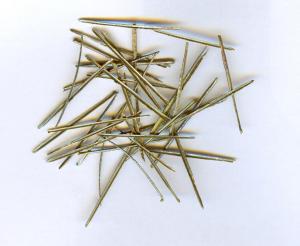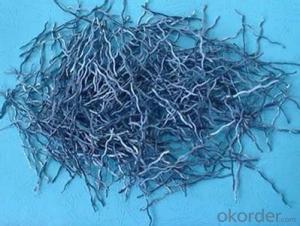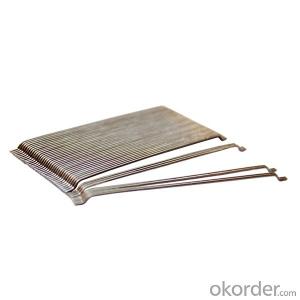Melt Extract Stainless Steel Fiber - Straight Type Steel Fiber from CNBM China
- Loading Port:
- Tianjin
- Payment Terms:
- TT OR LC
- Min Order Qty:
- 1000 kg
- Supply Capability:
- 30000 kg/month
OKorder Service Pledge
OKorder Financial Service
You Might Also Like
Quick Details
Place of Origin: Jiangsu, China (Mainland)
Model Number: HT-ST
Material: Steel
Specifications
Product overview
1, through the ISO9001 certification
More than
2, Material: low carbon steel wire
3. Shape: Hooked ends
4. High strength and high discount and the anchoring force is strong
5, The best effect in general, widely used in industrial floor and on the road
hook steel fiber
1, the length of 25 - 60 mm
2, the diameter of 0.5-1.0 mm
| Packaging Details: | Paper bag + pallet 25 kg / bag, 40 bags / pallet, 1 ton / pallet |
| Delivery Detail: | 15 |
Picture
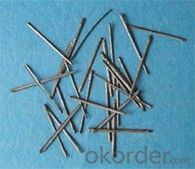
Steel fiber straight type
FAQ
certificated: ISO 9001
Technical advantages of Daye steel fiber:
Improve mechanical performance of concrete
Provide uniform distribution throughout concrete with excellent mixing
No balling or caking by adopt correct mixing method
Reduce concrete volume
Save construction time and cost
Reduce excavation volume
Available for jointless floor.
certificated: ISO 9001
Technical advantages of Daye steel fiber:
Improve mechanical performance of concrete
Provide uniform distribution throughout concrete with excellent mixing
No balling or caking by adopt correct mixing method
Reduce concrete volume
Save construction time and cost
Reduce excavation volume
Available for jointless floor.
- Q: What is the effect of melt extract stainless steel fiber on the plastic settlement of concrete?
- The effect of melt extract stainless steel fiber on the plastic settlement of concrete is that it helps to reduce the settlement and improve the overall stability and durability of the concrete. The fibers are dispersed throughout the concrete mixture, providing reinforcement and improving its resistance to cracking and shrinkage. This results in less plastic settlement and a more robust concrete structure.
- Q: Can melt extract stainless steel fiber improve the durability of concrete in acidic environments?
- Yes, melt extract stainless steel fiber can indeed improve the durability of concrete in acidic environments. Stainless steel fibers are known for their exceptional corrosion resistance properties, making them highly resistant to chemical attacks, including in acidic environments. When these fibers are added to concrete mixtures, they act as reinforcement, enhancing the overall strength and durability of the concrete. In acidic environments, concrete tends to deteriorate due to the chemical reactions between the acidic substances and the cement paste. This deterioration can lead to the loss of structural integrity and premature failure of the concrete. However, by incorporating melt extract stainless steel fibers into the concrete, the corrosion resistance of the material is significantly improved, thereby prolonging its service life in acidic conditions. The stainless steel fibers create a protective barrier within the concrete that prevents the penetration of acidic substances and minimizes the chemical reactions. Additionally, these fibers provide additional strength and toughness to the concrete matrix, making it more resistant to cracking and spalling that can occur in acidic environments. Furthermore, melt extract stainless steel fibers also enhance the overall durability of concrete by improving its resistance to other forms of deterioration, such as freeze-thaw cycles, abrasion, and impact. This further contributes to the longevity of the concrete in acidic environments. Overall, the addition of melt extract stainless steel fiber to concrete mixtures can significantly improve its durability and resistance to deterioration in acidic environments. It provides a cost-effective solution for enhancing the performance and extending the service life of concrete structures exposed to acidic conditions.
- Q: How does the addition of melt extract stainless steel fiber affect the setting time of concrete?
- The addition of melt extract stainless steel fiber can affect the setting time of concrete in a few ways. Firstly, the stainless steel fibers can act as nucleation sites for the formation of hydration products, which can accelerate the setting time of concrete. This is because the stainless steel fibers provide additional surface area for the hydration reactions to occur, leading to faster cement hydration and setting. Secondly, the stainless steel fibers can also improve the overall mechanical properties of the concrete, such as its tensile strength and crack resistance. This can indirectly affect the setting time of concrete by reducing the need for extended curing periods. With improved mechanical properties, the concrete can reach its desired strength faster, allowing for shorter setting times. However, it is important to note that the addition of melt extract stainless steel fiber should be carefully controlled to avoid any negative effects on the setting time of concrete. Excessive amounts of fibers can hinder the flowability of the concrete mixture, leading to longer setting times. Therefore, it is crucial to find the right dosage of stainless steel fibers to achieve the desired setting time and mechanical properties of the concrete. Additionally, the specific characteristics of the stainless steel fibers, such as their length and aspect ratio, can also influence the setting time of concrete and should be taken into consideration during the design and mixing process.
- Q: Can melt extract stainless steel fiber be used in marine structures?
- Yes, melt extract stainless steel fiber can be used in marine structures. Stainless steel is known for its corrosion resistance, making it suitable for use in marine environments where exposure to saltwater and high humidity is common. The melt extract stainless steel fibers can reinforce concrete or other construction materials used in marine structures, providing added strength and durability. These fibers are resistant to rust and can withstand the harsh conditions found in marine environments, making them an excellent choice for marine structures such as piers, docks, and offshore platforms. Additionally, the use of stainless steel fibers can help improve the overall performance and lifespan of these structures, reducing maintenance and repair costs in the long run.
- Q: What are the limitations of using melt extract stainless steel fiber in concrete?
- One limitation of using melt extract stainless steel fiber in concrete is the cost. Stainless steel fibers can be more expensive compared to other types of fibers, such as polypropylene or glass fibers. This can increase the overall cost of using stainless steel fiber in concrete construction projects. Another limitation is the potential for corrosion. While stainless steel is known for its corrosion resistance, in certain aggressive environments, such as chloride-rich conditions, it can still corrode over time. This corrosion can weaken the fibers and diminish their effectiveness in reinforcing the concrete. Additionally, the mixing and distribution of stainless steel fibers in the concrete can be challenging. The fibers tend to clump together and can be difficult to disperse evenly throughout the concrete mixture. This uneven distribution can result in inconsistent reinforcement and reduced performance. Lastly, the addition of stainless steel fibers can increase the viscosity of the concrete mixture, making it harder to pump and place. This can lead to difficulties in achieving proper compaction and workability, especially in complex and congested areas of construction. Overall, while melt extract stainless steel fibers offer enhanced strength and durability to concrete, their higher cost, potential for corrosion, challenges in mixing and distribution, and impact on workability are important limitations to consider when using them in concrete applications.
- Q: What is the recommended fiber volume fraction for melt extract stainless steel fiber in concrete?
- The optimal fiber volume fraction for melt extract stainless steel fiber in concrete may differ based on the specific application and desired performance characteristics. Typically, a recommended range of around 1-2% is suggested. This range effectively improves the concrete's tensile strength and crack resistance, while still allowing for proper workability during the mixing and placement process. To determine the ideal fiber volume fraction for the concrete application, consulting the manufacturer's guidelines and recommendations as well as considering the project requirements is crucial.
- Q: Can melt extract stainless steel fiber be used in precast concrete applications?
- Yes, melt extract stainless steel fiber can be used in precast concrete applications. It can enhance the mechanical properties of concrete and improve its durability, making it suitable for various precast concrete products such as beams, panels, and slabs.
- Q: Can melt extract stainless steel fiber be used in tunnel lining construction?
- Yes, melt extract stainless steel fiber can be used in tunnel lining construction. These fibers are commonly used as reinforcement in shotcrete applications for the lining of tunnels. They enhance the structural integrity and durability of the lining by improving crack resistance and reducing shrinkage. The stainless steel fibers have high tensile strength, corrosion resistance, and thermal stability, making them suitable for use in harsh tunnel environments. Additionally, they help to control spalling and enhance the overall performance of the tunnel lining.
- Q: What is the effect of melt extract stainless steel fiber on the modulus of rupture of concrete?
- The effect of melt extract stainless steel fiber on the modulus of rupture of concrete is generally positive. When stainless steel fibers are added to concrete, they enhance its tensile strength and ductility, leading to an increase in the modulus of rupture. This is because stainless steel fibers act as reinforcement within the concrete matrix, effectively bridging cracks and preventing their propagation. As a result, the concrete becomes more resistant to cracking and can withstand higher levels of stress before failure. The addition of melt extract stainless steel fibers also improves the overall durability and long-term performance of concrete. These fibers are resistant to corrosion, which is a common issue in concrete structures exposed to harsh environments or in contact with chemicals. By providing an additional layer of protection against corrosion, stainless steel fibers help to maintain the structural integrity and extend the service life of concrete. Furthermore, melt extract stainless steel fibers can enhance the impact resistance and fatigue strength of concrete. The fibers absorb and distribute energy during dynamic loading, reducing the risk of sudden failure or damage caused by impact or cyclic loading. This is particularly important in applications where the concrete is subjected to heavy loads or dynamic forces, such as in industrial floors, bridge decks, or pavements. It is worth noting that the specific effect of melt extract stainless steel fiber on the modulus of rupture can vary depending on factors such as fiber content, aspect ratio, and distribution within the concrete mix. Therefore, it is important to carefully consider the design and dosage of stainless steel fibers to achieve the desired improvement in the modulus of rupture and other mechanical properties of concrete.
- Q: What is the effect of melt extract stainless steel fiber on the durability of concrete?
- The durability of concrete can be greatly improved by using melt extract stainless steel fiber. Adding stainless steel fibers to concrete mixes enhances its mechanical properties and increases its resistance to different forms of deterioration. One major advantage of using stainless steel fibers is their ability to enhance the flexural strength and toughness of concrete. This improves the overall durability of the concrete structure, making it less prone to cracking and damage from external forces like impact or vibrations. The fibers also help distribute the load evenly throughout the concrete matrix, reducing the chances of localized failures. Furthermore, stainless steel fibers improve concrete's resistance to shrinkage and cracking caused by temperature changes. Acting as reinforcement within the concrete, they decrease the formation and propagation of micro-cracks. This is especially crucial in extreme weather conditions or environments with frequent thermal cycling. In addition, stainless steel fibers enhance concrete's resistance to chemical attack. They create a protective barrier against aggressive substances such as chlorides, sulfates, and acids that can penetrate the concrete and cause deterioration. By reducing the permeability of the concrete, the fibers help minimize the entry of harmful substances and extend the lifespan of the structure. To conclude, incorporating melt extract stainless steel fiber into concrete significantly boosts its durability by improving flexural strength, toughness, resistance to shrinkage and cracking, as well as resistance to chemical attack. These advantages contribute to the overall longevity and reliability of concrete structures, making them more resilient to different forms of degradation and ensuring their long-term performance.
Send your message to us
Melt Extract Stainless Steel Fiber - Straight Type Steel Fiber from CNBM China
- Loading Port:
- Tianjin
- Payment Terms:
- TT OR LC
- Min Order Qty:
- 1000 kg
- Supply Capability:
- 30000 kg/month
OKorder Service Pledge
OKorder Financial Service
Similar products
Hot products
Hot Searches
Related keywords
